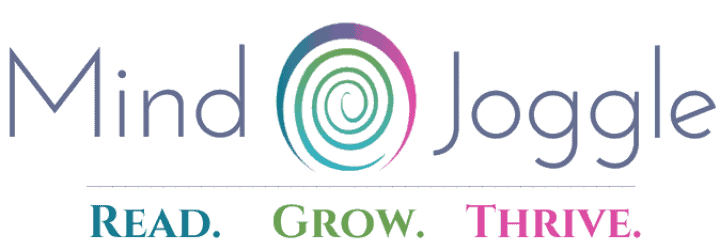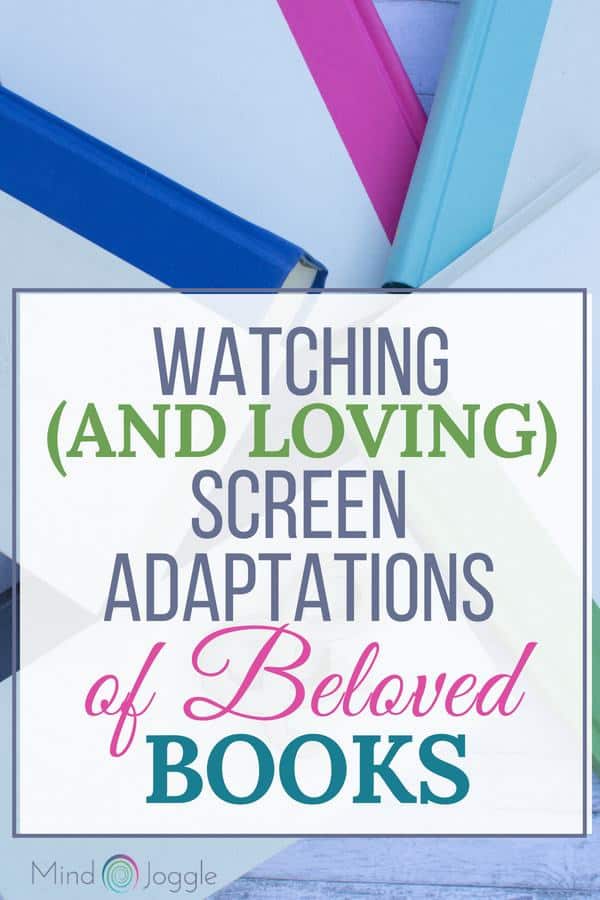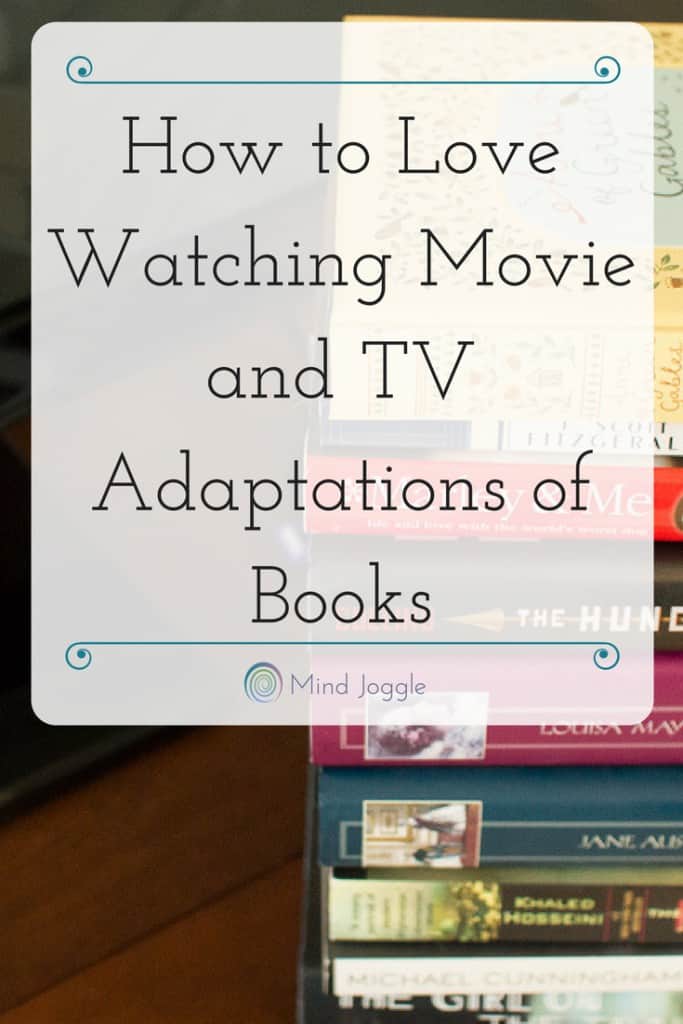How to Love Watching Movie and TV Adaptations of Books
How to love watching screen adaptations of your favorite books. Movie and TV versions may be different from the books you love, but that doesn’t automatically make them bad.
This post may include affiliate links. That means if you click and make a purchase, I may earn a small commission. Please see Disclosures for more information.
“The book is better than the movie.”
How many times have you said this (a bit smugly, admit it!) after watching a movie or TV adaptation of a book you love?
For die-hard fans of particular books, that disappointment in on-screen adaptations feels inevitable. While there are a few exceptions where the movie is better than the book, for the most part movies just aren’t long enough to capture everything we love about a book. Television, with its long seasons, offers more opportunity to explore the minutia of books, but the extra time also allows the story to veer from the book.
And in this “golden age of television,” more and more television shows are based on books. When we love a story so much, the pull to watch it is sometimes irresistible, even when we know it won’t be true to the book.
What I’m interested in is how to enjoy those adaptations, rather than burn with hatred at how they’ve ruined my precious favorite books.

And oh, that hatred burns bright for many book purists! They get angry at the directors (or writers, or actors, or whomever) for not being true to the stories they revere. They get angry at the fans who enjoy the adaptations (see: the smug “book is better” people). They get angry at the authors for “selling out” on their stories. There’s just anger all around, and I wonder: where has the fun gone? Aren’t books, movies, and TV shows supposed to be fun?
And now the internet allows people to pile on and take sides. The individual’s disappointment that once might have been mild and short-lived now gets shared and elevated and becomes a movement, at least in some circles. All in the name of stories that weren’t told in the way someone wants them to be told.
Of course, one way to avoid feeling this anger is to simply avoid watching adaptations. Read the books. Enjoy them. Love them. Keep your own vision of the characters, the settings, and the stories.
Or, if you haven’t yet read a book but you do see a movie or show based on one, don’t read the book.
Both are options. But if you want to enjoy both the book and the on-screen adaptation, you have to approach them with an open mind. Here’s what I do:
Read the Book First
Personally, I always like to watch adaptations, but I usually refuse to even consider it until I’ve read the book first. I want the full reading experience of imagining the characters, settings, and events in my mind before being influenced by how someone else pictures it. I don’t like anyone else’s vision to infiltrate mine while I read—and I feel like it always will if I watch the movie or TV show first. Sometimes even seeing pictures of the actors who play the characters before I read a book affects how I picture them: those actors are automatically in my head.
A book is almost always a richer experience, with access to characters’ internal thoughts and motivations, as well as events that can’t always be represented on film. Films sometimes allude to these things, without showing them. By reading first, I sometimes feel like I’m privy to secret information that other viewers may not have.
So read the book. Enjoy it. Love it. Geek out about it online, if that’s your thing. And then…
Watch the On-Screen Adaptation…
But accept that your vision of a book is just that—your own. No matter how thoroughly an author describes a setting or a character, what you see in your mind’s eye won’t exactly match what someone else sees. And finding an actor that exactly matches what you picture in your head? Unlikely. (My exception to this? Jamie and Claire in Outlander. Others will disagree, but for me, the actors on the show perfectly embody the characters that I pictured).
Separate what you’ve imagined the story to be from what you’re going to see onscreen. It will be different. Accept it. Don’t approach it with resistance; you’ll set yourself up to hate it.
If you’re a hate watcher, go for it. Get ready to resist and defend your vision of the book to the end. But I don’t like to waste time watching something I know I’m going to hate.
Don’t Catalog the Differences
It’s hard not to do this to some extent, especially if the film or show follows the book closely. There’s a mantra used in meditation that I think can be useful here: when the thoughts enter your mind, acknowledge them, and then let them go. The divergence may be taking you somewhere great, if you’re ready to go along for the ride. But to get on board, you have to…
Accept that You Are Watching a New Story
It may be very similar to the one you read. It may be completely different. It may add new dimensions to the book you loved (see: Anne with an E). But it will not be the same story that played out in your head.
And finally…
Trust the Storytellers
The people creating the show or movie are now the authors. When you read the book, you trusted the author to tell a good tale. Now trust the actors, directors, writers, and all the others involved in the film or show to tell you another good story. You may not be happy with their decisions. You may be upset about what happens to beloved characters—but this is true for books as well. In both cases, it’s not your story to tell.
Sure, you may feel a sense of ownership if you have an abiding love of the story, are part of the fandom, or have signed on for multiple seasons (and many hours of your life). And it’s fine to feel disappointed if things didn’t play out how you wanted. But rage that a story didn’t follow the path that you deemed correct? You may want to check your entitlement and then go write some fanfic.
___
Obviously, everyone has to decide for themselves how to approach adaptations of beloved books. I go for maximum enjoyment in both mediums. I actually find it fascinating to see how others imagined the book, how they bring it to life, and how it might differ from my own vision. While I watch, I can usually be fully on board with how they choose to tell the story onscreen.
I always know I may not love an adaptation, but it generally doesn’t taint my feelings about a book. For me, it’s just another telling of the story to consider. Sometimes, it’s a pleasant surprise to find an adaptation, long after I’ve read the book. I’m not much of a re-reader anymore (too many books, too little time), but on-screen adaptations allow me to revisit well-loved stories.
A recent find on Netflix was Into the Forest, with Ellen Page and Evan Rachel Wood. I read this book in a college class, and I’ve loved it for years but have rarely seen it mentioned anywhere. I have a weird fascination with survivalist stories (especially when they’re about ordinary people surviving when things fall apart, rather than teenagers saving the world), so this book has stuck with me over the years. While I didn’t love the movie, I didn’t hate it either, and I enjoyed seeing it brought to life onscreen.
I should note that I have, rarely, happened on the adaptation before reading the book. In some cases, I’ve decided to stay away from the book. I got hooked on the show The 100 before I ever found out that it’s based on a YA novel. A bit of reading online quickly told me that some pivotal characters on the show aren’t present in the book at all. I’m invested in the show right now, and it’s still running. At some point, I may check out the book, but that will likely happen after the show is over.
There are so many on-screen adaptations out there right now. How do you approach them after reading and loving the books on which they’re based?



